Positive Leadership, LMX, PsyCap, and Employee Performance Analysis
VerifiedAdded on 2022/09/17
|11
|2996
|26
Essay
AI Summary
This essay examines the multifaceted impact of positive leadership on organizational capabilities and employee performance. It begins by defining leadership and highlighting the significance of psychological capital (PsyCap), encompassing hope, optimism, self-efficacy, and resilience, in fostering positive employee behavior and job satisfaction. The essay then delves into the Leader-Member Exchange (LMX) theory, emphasizing the importance of leader-follower relationships and stages of role taking, role making, and routinization in building a collaborative work environment. The discussion extends to authentic leadership, exploring its role in promoting transparency, openness, and employee value, thereby reinforcing PsyCap. The essay further analyzes the role of emotions in shaping employee performance and building self-awareness, collaboration, and social skills. It concludes by emphasizing the importance of leaders in fostering PsyCap through hope, optimism, and resilience, ultimately driving organizational success. The essay references several studies to support the arguments.
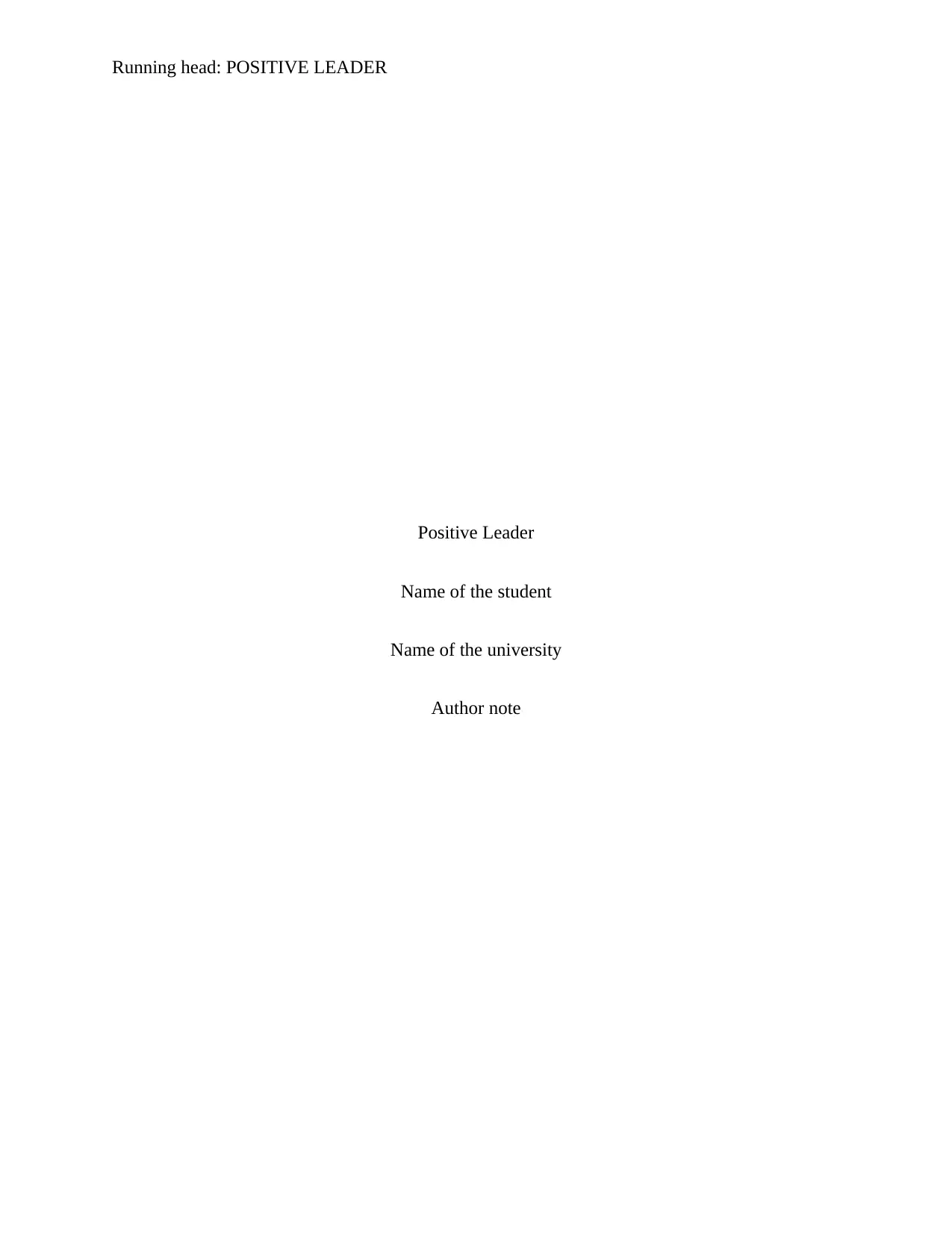
Running head: POSITIVE LEADER
Positive Leader
Name of the student
Name of the university
Author note
Positive Leader
Name of the student
Name of the university
Author note
Paraphrase This Document
Need a fresh take? Get an instant paraphrase of this document with our AI Paraphraser
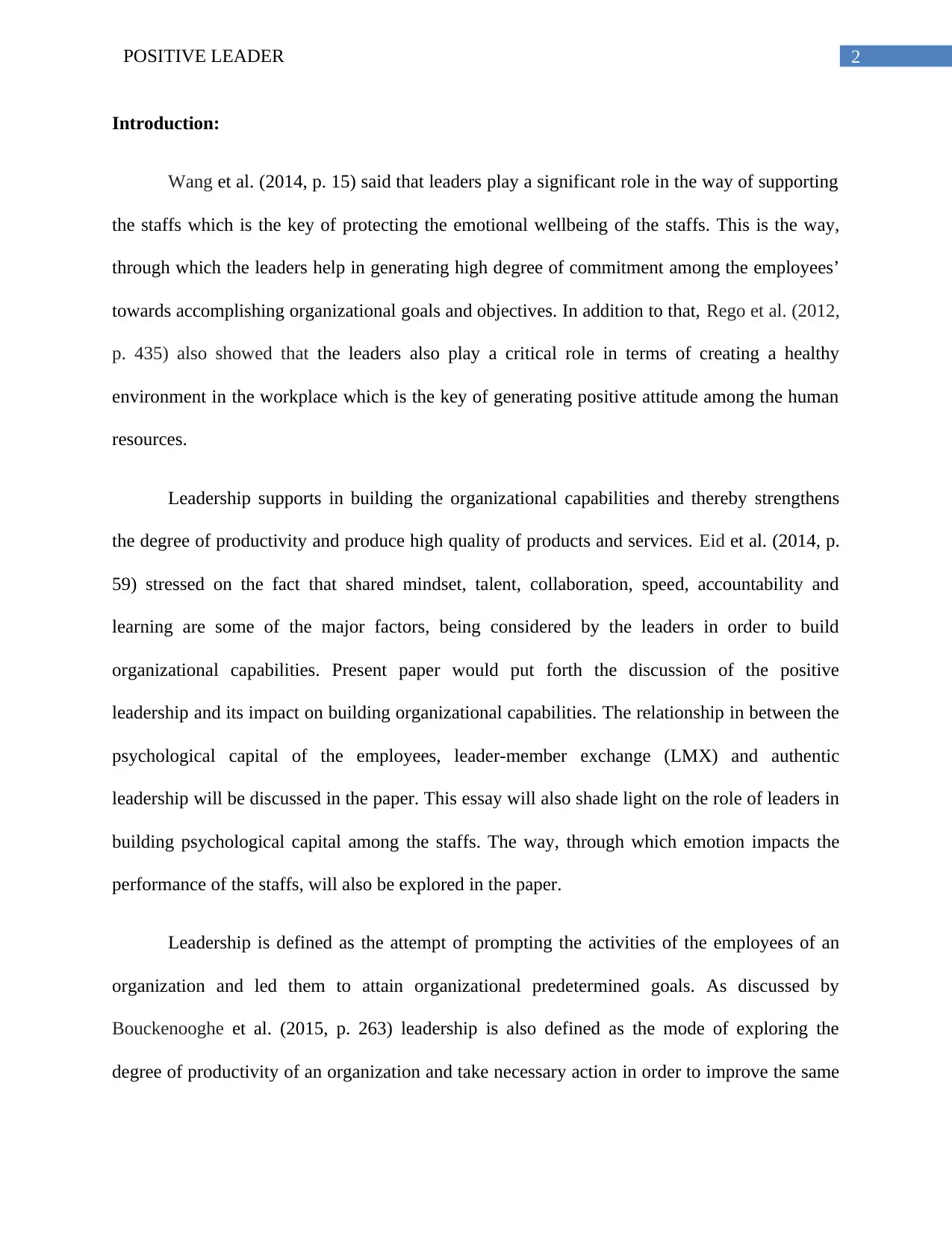
2POSITIVE LEADER
Introduction:
Wang et al. (2014, p. 15) said that leaders play a significant role in the way of supporting
the staffs which is the key of protecting the emotional wellbeing of the staffs. This is the way,
through which the leaders help in generating high degree of commitment among the employees’
towards accomplishing organizational goals and objectives. In addition to that, Rego et al. (2012,
p. 435) also showed that the leaders also play a critical role in terms of creating a healthy
environment in the workplace which is the key of generating positive attitude among the human
resources.
Leadership supports in building the organizational capabilities and thereby strengthens
the degree of productivity and produce high quality of products and services. Eid et al. (2014, p.
59) stressed on the fact that shared mindset, talent, collaboration, speed, accountability and
learning are some of the major factors, being considered by the leaders in order to build
organizational capabilities. Present paper would put forth the discussion of the positive
leadership and its impact on building organizational capabilities. The relationship in between the
psychological capital of the employees, leader-member exchange (LMX) and authentic
leadership will be discussed in the paper. This essay will also shade light on the role of leaders in
building psychological capital among the staffs. The way, through which emotion impacts the
performance of the staffs, will also be explored in the paper.
Leadership is defined as the attempt of prompting the activities of the employees of an
organization and led them to attain organizational predetermined goals. As discussed by
Bouckenooghe et al. (2015, p. 263) leadership is also defined as the mode of exploring the
degree of productivity of an organization and take necessary action in order to improve the same
Introduction:
Wang et al. (2014, p. 15) said that leaders play a significant role in the way of supporting
the staffs which is the key of protecting the emotional wellbeing of the staffs. This is the way,
through which the leaders help in generating high degree of commitment among the employees’
towards accomplishing organizational goals and objectives. In addition to that, Rego et al. (2012,
p. 435) also showed that the leaders also play a critical role in terms of creating a healthy
environment in the workplace which is the key of generating positive attitude among the human
resources.
Leadership supports in building the organizational capabilities and thereby strengthens
the degree of productivity and produce high quality of products and services. Eid et al. (2014, p.
59) stressed on the fact that shared mindset, talent, collaboration, speed, accountability and
learning are some of the major factors, being considered by the leaders in order to build
organizational capabilities. Present paper would put forth the discussion of the positive
leadership and its impact on building organizational capabilities. The relationship in between the
psychological capital of the employees, leader-member exchange (LMX) and authentic
leadership will be discussed in the paper. This essay will also shade light on the role of leaders in
building psychological capital among the staffs. The way, through which emotion impacts the
performance of the staffs, will also be explored in the paper.
Leadership is defined as the attempt of prompting the activities of the employees of an
organization and led them to attain organizational predetermined goals. As discussed by
Bouckenooghe et al. (2015, p. 263) leadership is also defined as the mode of exploring the
degree of productivity of an organization and take necessary action in order to improve the same
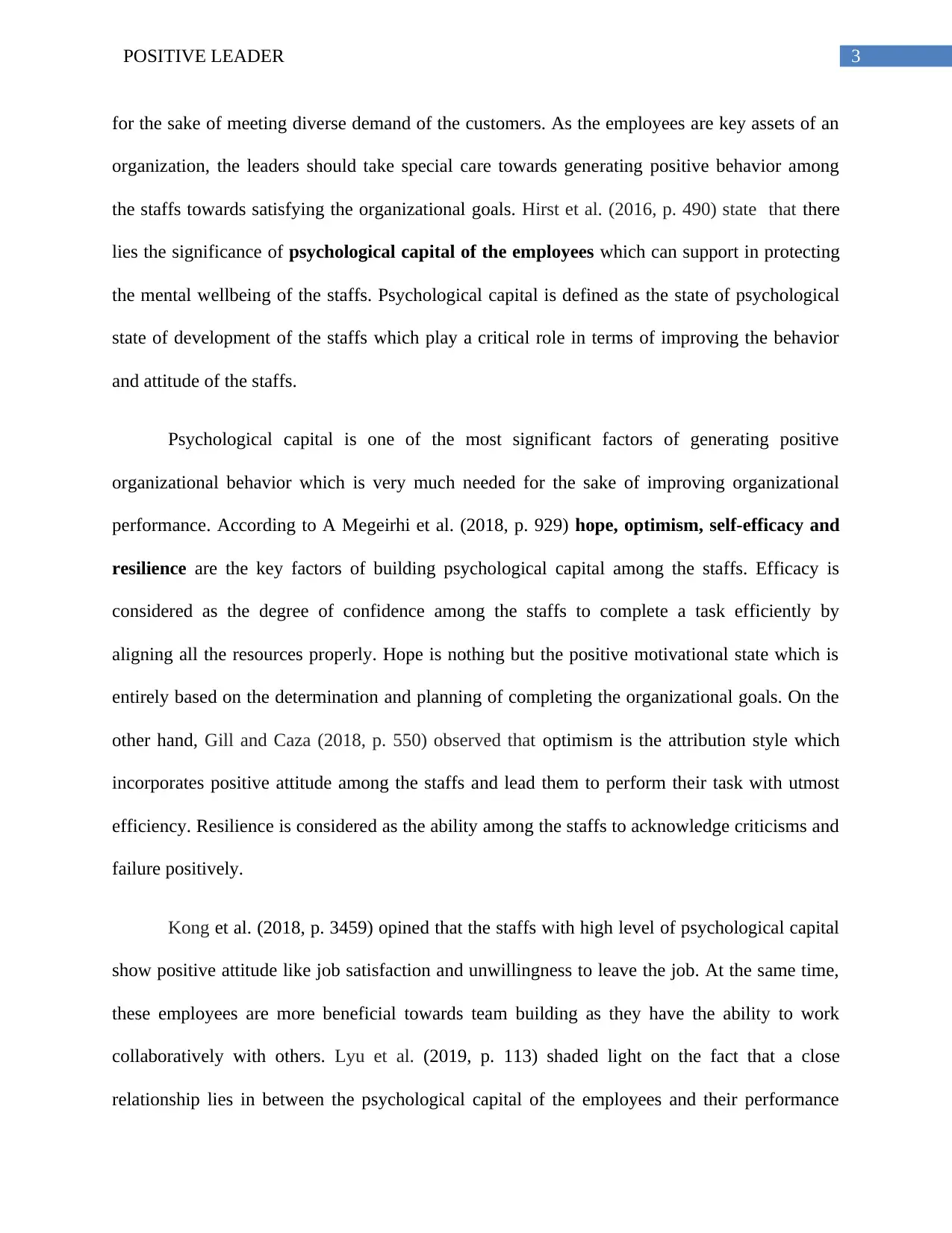
3POSITIVE LEADER
for the sake of meeting diverse demand of the customers. As the employees are key assets of an
organization, the leaders should take special care towards generating positive behavior among
the staffs towards satisfying the organizational goals. Hirst et al. (2016, p. 490) state that there
lies the significance of psychological capital of the employees which can support in protecting
the mental wellbeing of the staffs. Psychological capital is defined as the state of psychological
state of development of the staffs which play a critical role in terms of improving the behavior
and attitude of the staffs.
Psychological capital is one of the most significant factors of generating positive
organizational behavior which is very much needed for the sake of improving organizational
performance. According to A Megeirhi et al. (2018, p. 929) hope, optimism, self-efficacy and
resilience are the key factors of building psychological capital among the staffs. Efficacy is
considered as the degree of confidence among the staffs to complete a task efficiently by
aligning all the resources properly. Hope is nothing but the positive motivational state which is
entirely based on the determination and planning of completing the organizational goals. On the
other hand, Gill and Caza (2018, p. 550) observed that optimism is the attribution style which
incorporates positive attitude among the staffs and lead them to perform their task with utmost
efficiency. Resilience is considered as the ability among the staffs to acknowledge criticisms and
failure positively.
Kong et al. (2018, p. 3459) opined that the staffs with high level of psychological capital
show positive attitude like job satisfaction and unwillingness to leave the job. At the same time,
these employees are more beneficial towards team building as they have the ability to work
collaboratively with others. Lyu et al. (2019, p. 113) shaded light on the fact that a close
relationship lies in between the psychological capital of the employees and their performance
for the sake of meeting diverse demand of the customers. As the employees are key assets of an
organization, the leaders should take special care towards generating positive behavior among
the staffs towards satisfying the organizational goals. Hirst et al. (2016, p. 490) state that there
lies the significance of psychological capital of the employees which can support in protecting
the mental wellbeing of the staffs. Psychological capital is defined as the state of psychological
state of development of the staffs which play a critical role in terms of improving the behavior
and attitude of the staffs.
Psychological capital is one of the most significant factors of generating positive
organizational behavior which is very much needed for the sake of improving organizational
performance. According to A Megeirhi et al. (2018, p. 929) hope, optimism, self-efficacy and
resilience are the key factors of building psychological capital among the staffs. Efficacy is
considered as the degree of confidence among the staffs to complete a task efficiently by
aligning all the resources properly. Hope is nothing but the positive motivational state which is
entirely based on the determination and planning of completing the organizational goals. On the
other hand, Gill and Caza (2018, p. 550) observed that optimism is the attribution style which
incorporates positive attitude among the staffs and lead them to perform their task with utmost
efficiency. Resilience is considered as the ability among the staffs to acknowledge criticisms and
failure positively.
Kong et al. (2018, p. 3459) opined that the staffs with high level of psychological capital
show positive attitude like job satisfaction and unwillingness to leave the job. At the same time,
these employees are more beneficial towards team building as they have the ability to work
collaboratively with others. Lyu et al. (2019, p. 113) shaded light on the fact that a close
relationship lies in between the psychological capital of the employees and their performance
⊘ This is a preview!⊘
Do you want full access?
Subscribe today to unlock all pages.

Trusted by 1+ million students worldwide
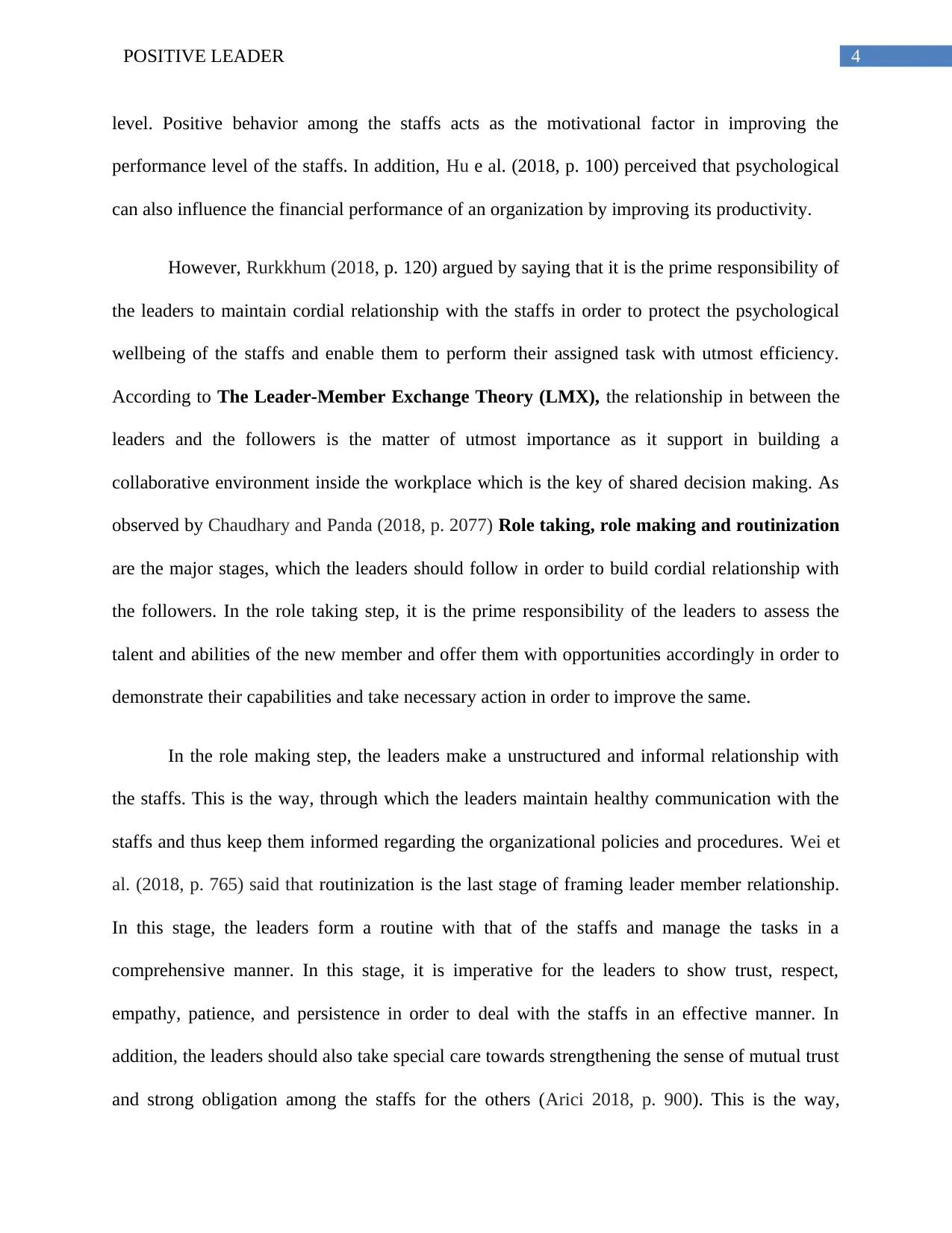
4POSITIVE LEADER
level. Positive behavior among the staffs acts as the motivational factor in improving the
performance level of the staffs. In addition, Hu e al. (2018, p. 100) perceived that psychological
can also influence the financial performance of an organization by improving its productivity.
However, Rurkkhum (2018, p. 120) argued by saying that it is the prime responsibility of
the leaders to maintain cordial relationship with the staffs in order to protect the psychological
wellbeing of the staffs and enable them to perform their assigned task with utmost efficiency.
According to The Leader-Member Exchange Theory (LMX), the relationship in between the
leaders and the followers is the matter of utmost importance as it support in building a
collaborative environment inside the workplace which is the key of shared decision making. As
observed by Chaudhary and Panda (2018, p. 2077) Role taking, role making and routinization
are the major stages, which the leaders should follow in order to build cordial relationship with
the followers. In the role taking step, it is the prime responsibility of the leaders to assess the
talent and abilities of the new member and offer them with opportunities accordingly in order to
demonstrate their capabilities and take necessary action in order to improve the same.
In the role making step, the leaders make a unstructured and informal relationship with
the staffs. This is the way, through which the leaders maintain healthy communication with the
staffs and thus keep them informed regarding the organizational policies and procedures. Wei et
al. (2018, p. 765) said that routinization is the last stage of framing leader member relationship.
In this stage, the leaders form a routine with that of the staffs and manage the tasks in a
comprehensive manner. In this stage, it is imperative for the leaders to show trust, respect,
empathy, patience, and persistence in order to deal with the staffs in an effective manner. In
addition, the leaders should also take special care towards strengthening the sense of mutual trust
and strong obligation among the staffs for the others (Arici 2018, p. 900). This is the way,
level. Positive behavior among the staffs acts as the motivational factor in improving the
performance level of the staffs. In addition, Hu e al. (2018, p. 100) perceived that psychological
can also influence the financial performance of an organization by improving its productivity.
However, Rurkkhum (2018, p. 120) argued by saying that it is the prime responsibility of
the leaders to maintain cordial relationship with the staffs in order to protect the psychological
wellbeing of the staffs and enable them to perform their assigned task with utmost efficiency.
According to The Leader-Member Exchange Theory (LMX), the relationship in between the
leaders and the followers is the matter of utmost importance as it support in building a
collaborative environment inside the workplace which is the key of shared decision making. As
observed by Chaudhary and Panda (2018, p. 2077) Role taking, role making and routinization
are the major stages, which the leaders should follow in order to build cordial relationship with
the followers. In the role taking step, it is the prime responsibility of the leaders to assess the
talent and abilities of the new member and offer them with opportunities accordingly in order to
demonstrate their capabilities and take necessary action in order to improve the same.
In the role making step, the leaders make a unstructured and informal relationship with
the staffs. This is the way, through which the leaders maintain healthy communication with the
staffs and thus keep them informed regarding the organizational policies and procedures. Wei et
al. (2018, p. 765) said that routinization is the last stage of framing leader member relationship.
In this stage, the leaders form a routine with that of the staffs and manage the tasks in a
comprehensive manner. In this stage, it is imperative for the leaders to show trust, respect,
empathy, patience, and persistence in order to deal with the staffs in an effective manner. In
addition, the leaders should also take special care towards strengthening the sense of mutual trust
and strong obligation among the staffs for the others (Arici 2018, p. 900). This is the way,
Paraphrase This Document
Need a fresh take? Get an instant paraphrase of this document with our AI Paraphraser
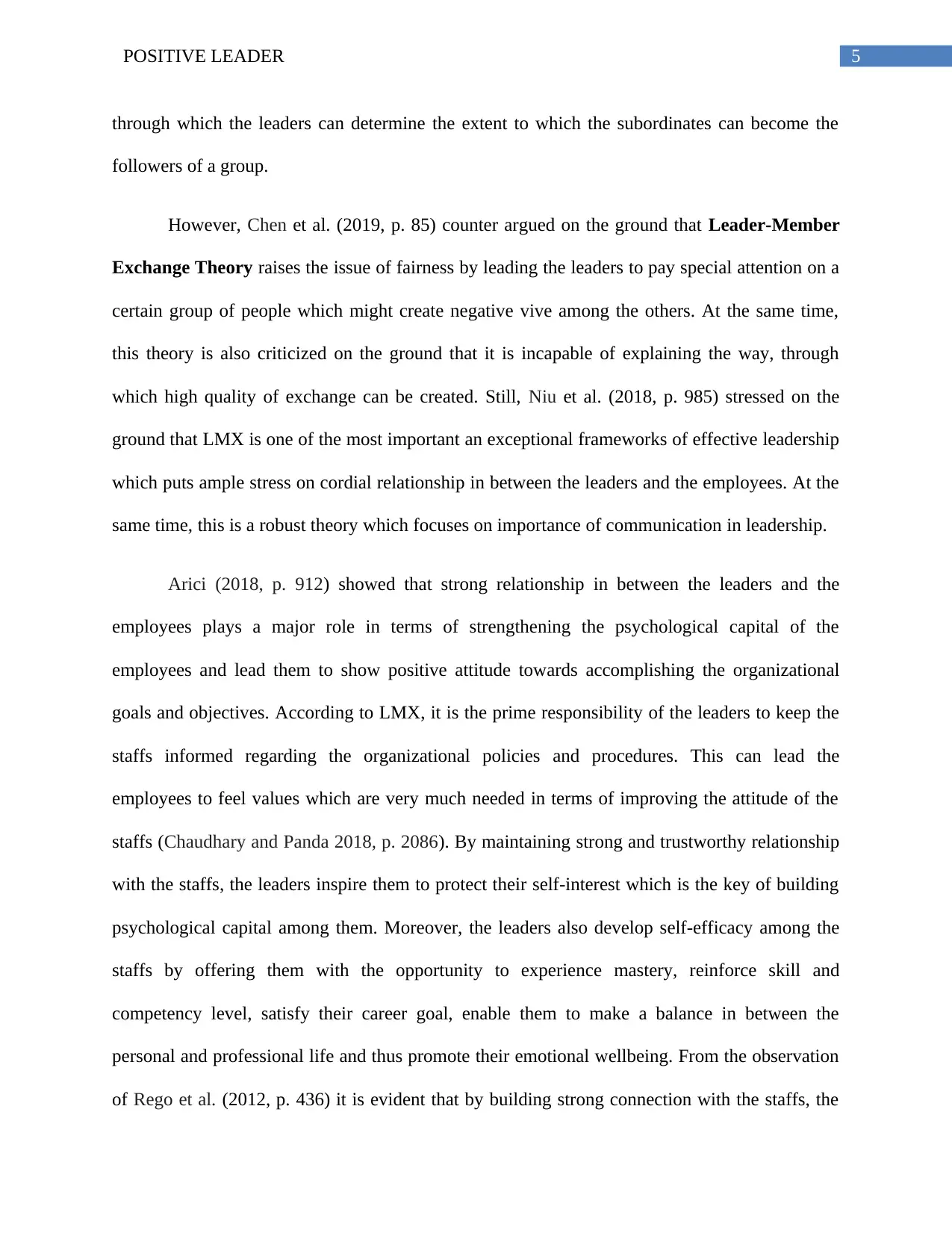
5POSITIVE LEADER
through which the leaders can determine the extent to which the subordinates can become the
followers of a group.
However, Chen et al. (2019, p. 85) counter argued on the ground that Leader-Member
Exchange Theory raises the issue of fairness by leading the leaders to pay special attention on a
certain group of people which might create negative vive among the others. At the same time,
this theory is also criticized on the ground that it is incapable of explaining the way, through
which high quality of exchange can be created. Still, Niu et al. (2018, p. 985) stressed on the
ground that LMX is one of the most important an exceptional frameworks of effective leadership
which puts ample stress on cordial relationship in between the leaders and the employees. At the
same time, this is a robust theory which focuses on importance of communication in leadership.
Arici (2018, p. 912) showed that strong relationship in between the leaders and the
employees plays a major role in terms of strengthening the psychological capital of the
employees and lead them to show positive attitude towards accomplishing the organizational
goals and objectives. According to LMX, it is the prime responsibility of the leaders to keep the
staffs informed regarding the organizational policies and procedures. This can lead the
employees to feel values which are very much needed in terms of improving the attitude of the
staffs (Chaudhary and Panda 2018, p. 2086). By maintaining strong and trustworthy relationship
with the staffs, the leaders inspire them to protect their self-interest which is the key of building
psychological capital among them. Moreover, the leaders also develop self-efficacy among the
staffs by offering them with the opportunity to experience mastery, reinforce skill and
competency level, satisfy their career goal, enable them to make a balance in between the
personal and professional life and thus promote their emotional wellbeing. From the observation
of Rego et al. (2012, p. 436) it is evident that by building strong connection with the staffs, the
through which the leaders can determine the extent to which the subordinates can become the
followers of a group.
However, Chen et al. (2019, p. 85) counter argued on the ground that Leader-Member
Exchange Theory raises the issue of fairness by leading the leaders to pay special attention on a
certain group of people which might create negative vive among the others. At the same time,
this theory is also criticized on the ground that it is incapable of explaining the way, through
which high quality of exchange can be created. Still, Niu et al. (2018, p. 985) stressed on the
ground that LMX is one of the most important an exceptional frameworks of effective leadership
which puts ample stress on cordial relationship in between the leaders and the employees. At the
same time, this is a robust theory which focuses on importance of communication in leadership.
Arici (2018, p. 912) showed that strong relationship in between the leaders and the
employees plays a major role in terms of strengthening the psychological capital of the
employees and lead them to show positive attitude towards accomplishing the organizational
goals and objectives. According to LMX, it is the prime responsibility of the leaders to keep the
staffs informed regarding the organizational policies and procedures. This can lead the
employees to feel values which are very much needed in terms of improving the attitude of the
staffs (Chaudhary and Panda 2018, p. 2086). By maintaining strong and trustworthy relationship
with the staffs, the leaders inspire them to protect their self-interest which is the key of building
psychological capital among them. Moreover, the leaders also develop self-efficacy among the
staffs by offering them with the opportunity to experience mastery, reinforce skill and
competency level, satisfy their career goal, enable them to make a balance in between the
personal and professional life and thus promote their emotional wellbeing. From the observation
of Rego et al. (2012, p. 436) it is evident that by building strong connection with the staffs, the
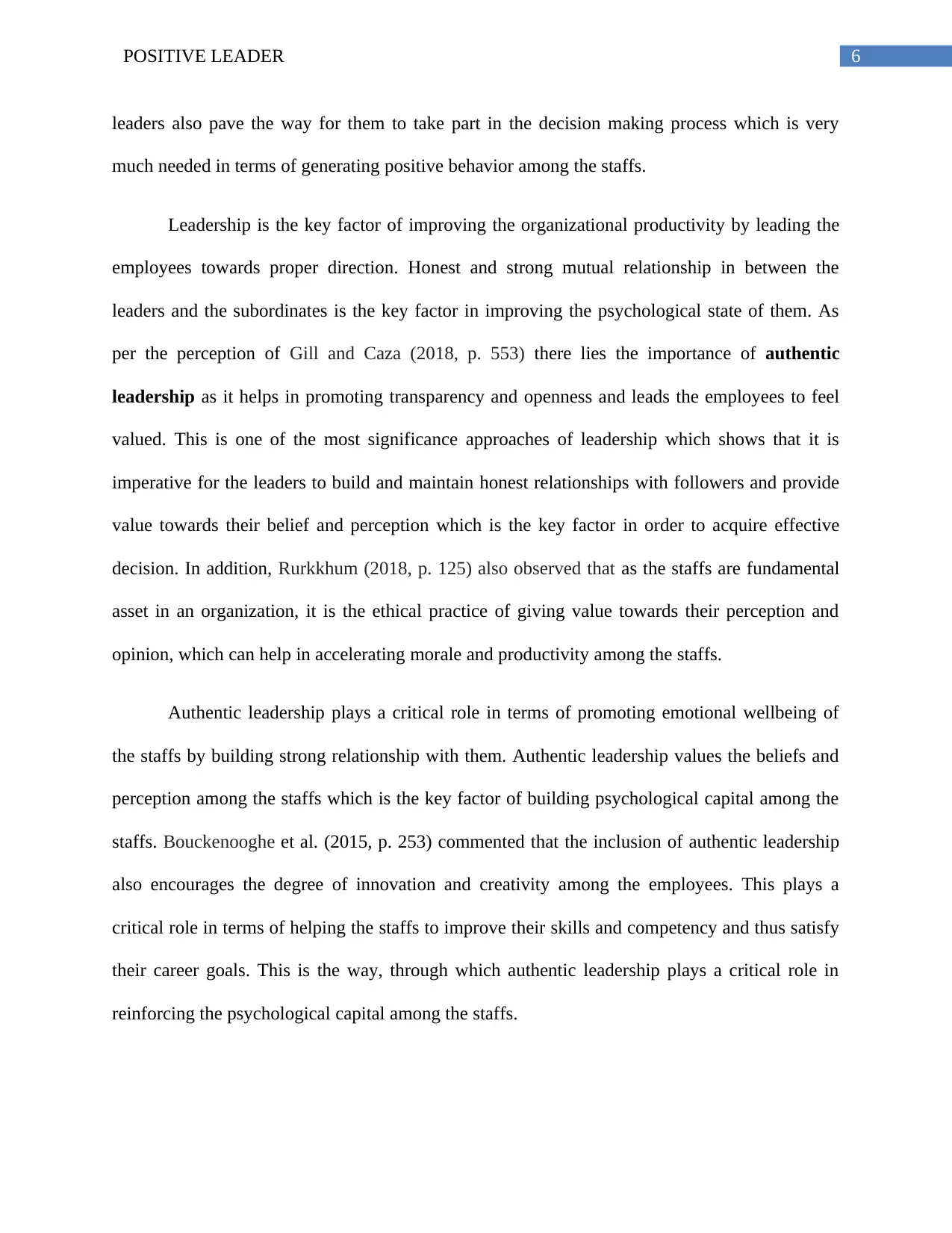
6POSITIVE LEADER
leaders also pave the way for them to take part in the decision making process which is very
much needed in terms of generating positive behavior among the staffs.
Leadership is the key factor of improving the organizational productivity by leading the
employees towards proper direction. Honest and strong mutual relationship in between the
leaders and the subordinates is the key factor in improving the psychological state of them. As
per the perception of Gill and Caza (2018, p. 553) there lies the importance of authentic
leadership as it helps in promoting transparency and openness and leads the employees to feel
valued. This is one of the most significance approaches of leadership which shows that it is
imperative for the leaders to build and maintain honest relationships with followers and provide
value towards their belief and perception which is the key factor in order to acquire effective
decision. In addition, Rurkkhum (2018, p. 125) also observed that as the staffs are fundamental
asset in an organization, it is the ethical practice of giving value towards their perception and
opinion, which can help in accelerating morale and productivity among the staffs.
Authentic leadership plays a critical role in terms of promoting emotional wellbeing of
the staffs by building strong relationship with them. Authentic leadership values the beliefs and
perception among the staffs which is the key factor of building psychological capital among the
staffs. Bouckenooghe et al. (2015, p. 253) commented that the inclusion of authentic leadership
also encourages the degree of innovation and creativity among the employees. This plays a
critical role in terms of helping the staffs to improve their skills and competency and thus satisfy
their career goals. This is the way, through which authentic leadership plays a critical role in
reinforcing the psychological capital among the staffs.
leaders also pave the way for them to take part in the decision making process which is very
much needed in terms of generating positive behavior among the staffs.
Leadership is the key factor of improving the organizational productivity by leading the
employees towards proper direction. Honest and strong mutual relationship in between the
leaders and the subordinates is the key factor in improving the psychological state of them. As
per the perception of Gill and Caza (2018, p. 553) there lies the importance of authentic
leadership as it helps in promoting transparency and openness and leads the employees to feel
valued. This is one of the most significance approaches of leadership which shows that it is
imperative for the leaders to build and maintain honest relationships with followers and provide
value towards their belief and perception which is the key factor in order to acquire effective
decision. In addition, Rurkkhum (2018, p. 125) also observed that as the staffs are fundamental
asset in an organization, it is the ethical practice of giving value towards their perception and
opinion, which can help in accelerating morale and productivity among the staffs.
Authentic leadership plays a critical role in terms of promoting emotional wellbeing of
the staffs by building strong relationship with them. Authentic leadership values the beliefs and
perception among the staffs which is the key factor of building psychological capital among the
staffs. Bouckenooghe et al. (2015, p. 253) commented that the inclusion of authentic leadership
also encourages the degree of innovation and creativity among the employees. This plays a
critical role in terms of helping the staffs to improve their skills and competency and thus satisfy
their career goals. This is the way, through which authentic leadership plays a critical role in
reinforcing the psychological capital among the staffs.
⊘ This is a preview!⊘
Do you want full access?
Subscribe today to unlock all pages.

Trusted by 1+ million students worldwide
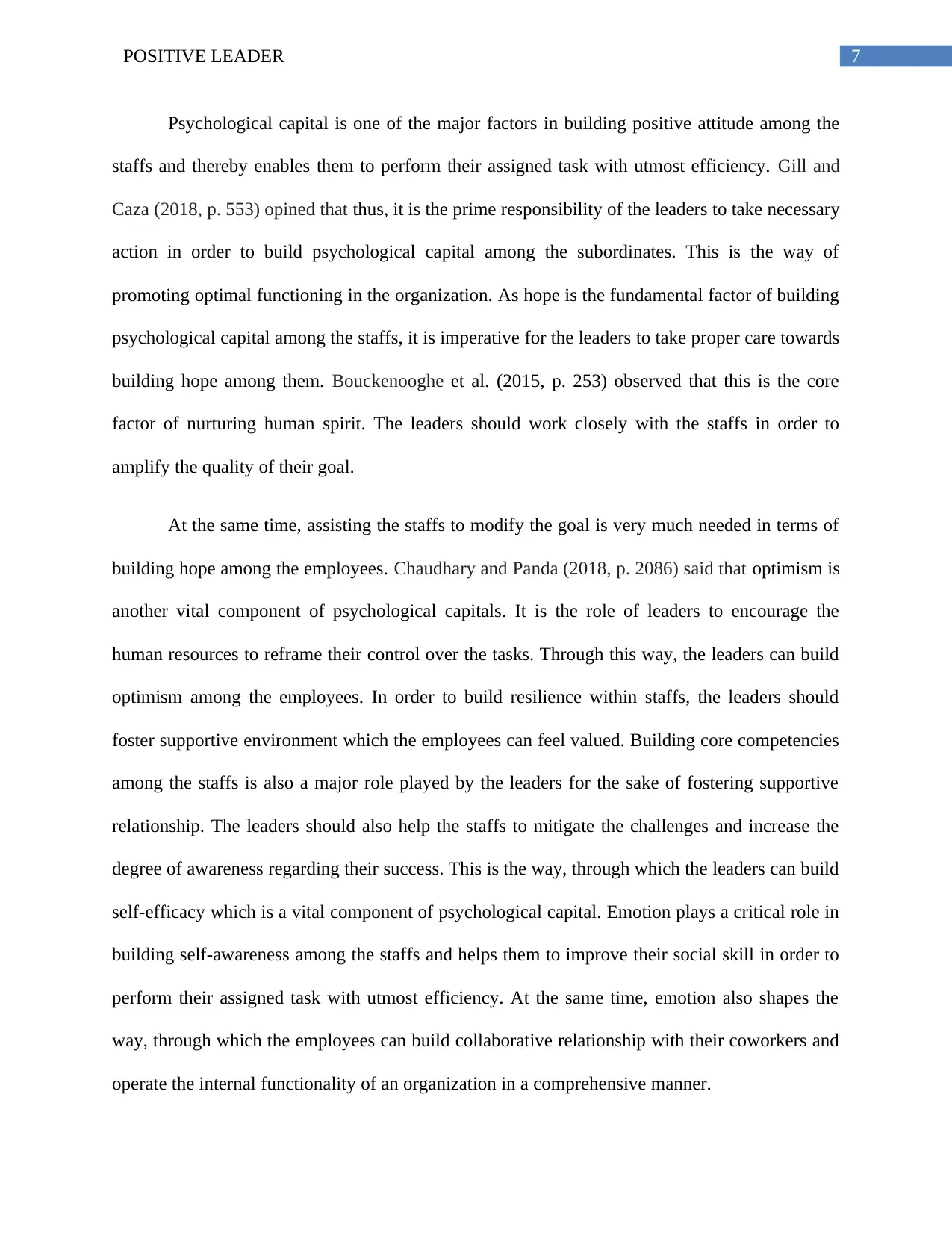
7POSITIVE LEADER
Psychological capital is one of the major factors in building positive attitude among the
staffs and thereby enables them to perform their assigned task with utmost efficiency. Gill and
Caza (2018, p. 553) opined that thus, it is the prime responsibility of the leaders to take necessary
action in order to build psychological capital among the subordinates. This is the way of
promoting optimal functioning in the organization. As hope is the fundamental factor of building
psychological capital among the staffs, it is imperative for the leaders to take proper care towards
building hope among them. Bouckenooghe et al. (2015, p. 253) observed that this is the core
factor of nurturing human spirit. The leaders should work closely with the staffs in order to
amplify the quality of their goal.
At the same time, assisting the staffs to modify the goal is very much needed in terms of
building hope among the employees. Chaudhary and Panda (2018, p. 2086) said that optimism is
another vital component of psychological capitals. It is the role of leaders to encourage the
human resources to reframe their control over the tasks. Through this way, the leaders can build
optimism among the employees. In order to build resilience within staffs, the leaders should
foster supportive environment which the employees can feel valued. Building core competencies
among the staffs is also a major role played by the leaders for the sake of fostering supportive
relationship. The leaders should also help the staffs to mitigate the challenges and increase the
degree of awareness regarding their success. This is the way, through which the leaders can build
self-efficacy which is a vital component of psychological capital. Emotion plays a critical role in
building self-awareness among the staffs and helps them to improve their social skill in order to
perform their assigned task with utmost efficiency. At the same time, emotion also shapes the
way, through which the employees can build collaborative relationship with their coworkers and
operate the internal functionality of an organization in a comprehensive manner.
Psychological capital is one of the major factors in building positive attitude among the
staffs and thereby enables them to perform their assigned task with utmost efficiency. Gill and
Caza (2018, p. 553) opined that thus, it is the prime responsibility of the leaders to take necessary
action in order to build psychological capital among the subordinates. This is the way of
promoting optimal functioning in the organization. As hope is the fundamental factor of building
psychological capital among the staffs, it is imperative for the leaders to take proper care towards
building hope among them. Bouckenooghe et al. (2015, p. 253) observed that this is the core
factor of nurturing human spirit. The leaders should work closely with the staffs in order to
amplify the quality of their goal.
At the same time, assisting the staffs to modify the goal is very much needed in terms of
building hope among the employees. Chaudhary and Panda (2018, p. 2086) said that optimism is
another vital component of psychological capitals. It is the role of leaders to encourage the
human resources to reframe their control over the tasks. Through this way, the leaders can build
optimism among the employees. In order to build resilience within staffs, the leaders should
foster supportive environment which the employees can feel valued. Building core competencies
among the staffs is also a major role played by the leaders for the sake of fostering supportive
relationship. The leaders should also help the staffs to mitigate the challenges and increase the
degree of awareness regarding their success. This is the way, through which the leaders can build
self-efficacy which is a vital component of psychological capital. Emotion plays a critical role in
building self-awareness among the staffs and helps them to improve their social skill in order to
perform their assigned task with utmost efficiency. At the same time, emotion also shapes the
way, through which the employees can build collaborative relationship with their coworkers and
operate the internal functionality of an organization in a comprehensive manner.
Paraphrase This Document
Need a fresh take? Get an instant paraphrase of this document with our AI Paraphraser
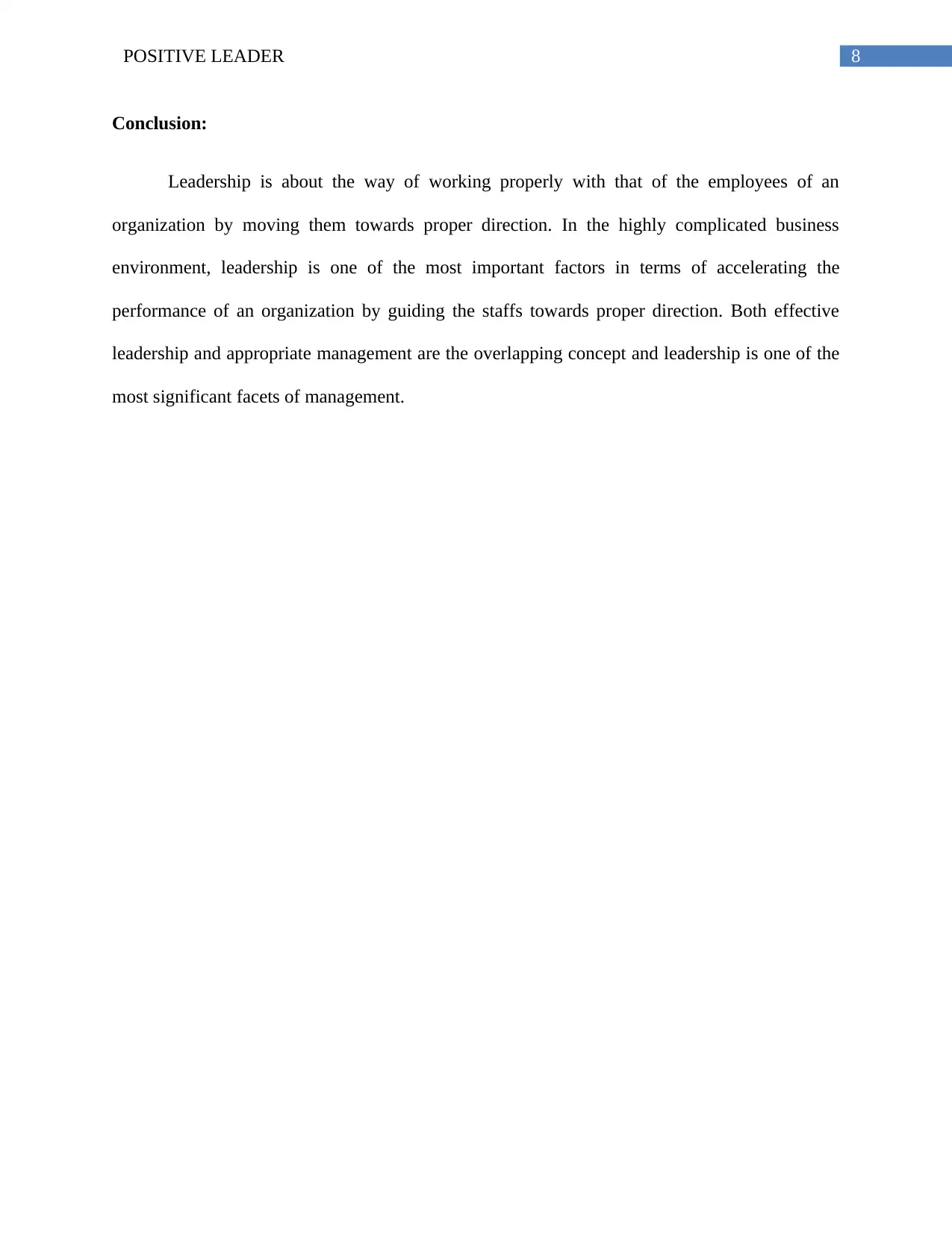
8POSITIVE LEADER
Conclusion:
Leadership is about the way of working properly with that of the employees of an
organization by moving them towards proper direction. In the highly complicated business
environment, leadership is one of the most important factors in terms of accelerating the
performance of an organization by guiding the staffs towards proper direction. Both effective
leadership and appropriate management are the overlapping concept and leadership is one of the
most significant facets of management.
Conclusion:
Leadership is about the way of working properly with that of the employees of an
organization by moving them towards proper direction. In the highly complicated business
environment, leadership is one of the most important factors in terms of accelerating the
performance of an organization by guiding the staffs towards proper direction. Both effective
leadership and appropriate management are the overlapping concept and leadership is one of the
most significant facets of management.
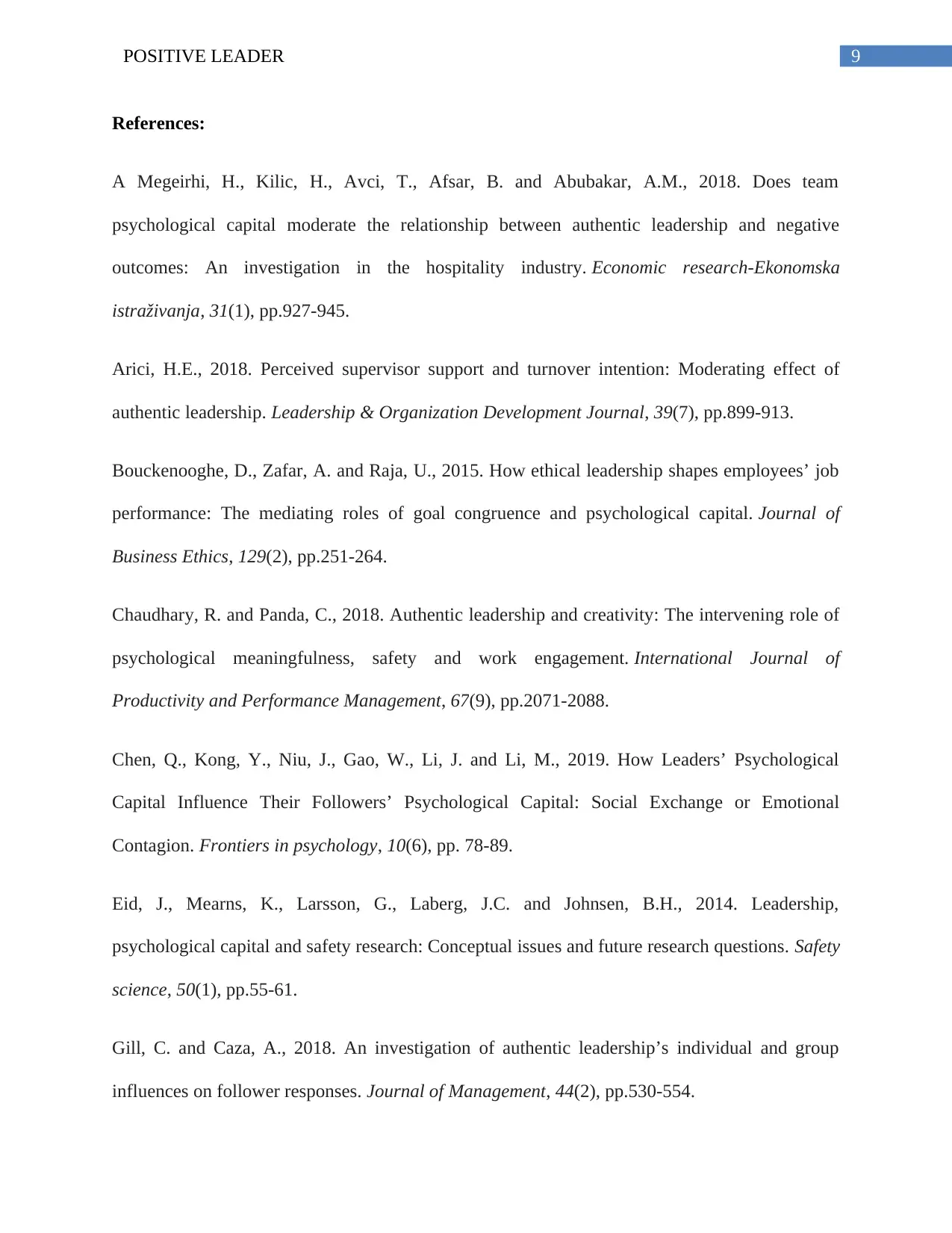
9POSITIVE LEADER
References:
A Megeirhi, H., Kilic, H., Avci, T., Afsar, B. and Abubakar, A.M., 2018. Does team
psychological capital moderate the relationship between authentic leadership and negative
outcomes: An investigation in the hospitality industry. Economic research-Ekonomska
istraživanja, 31(1), pp.927-945.
Arici, H.E., 2018. Perceived supervisor support and turnover intention: Moderating effect of
authentic leadership. Leadership & Organization Development Journal, 39(7), pp.899-913.
Bouckenooghe, D., Zafar, A. and Raja, U., 2015. How ethical leadership shapes employees’ job
performance: The mediating roles of goal congruence and psychological capital. Journal of
Business Ethics, 129(2), pp.251-264.
Chaudhary, R. and Panda, C., 2018. Authentic leadership and creativity: The intervening role of
psychological meaningfulness, safety and work engagement. International Journal of
Productivity and Performance Management, 67(9), pp.2071-2088.
Chen, Q., Kong, Y., Niu, J., Gao, W., Li, J. and Li, M., 2019. How Leaders’ Psychological
Capital Influence Their Followers’ Psychological Capital: Social Exchange or Emotional
Contagion. Frontiers in psychology, 10(6), pp. 78-89.
Eid, J., Mearns, K., Larsson, G., Laberg, J.C. and Johnsen, B.H., 2014. Leadership,
psychological capital and safety research: Conceptual issues and future research questions. Safety
science, 50(1), pp.55-61.
Gill, C. and Caza, A., 2018. An investigation of authentic leadership’s individual and group
influences on follower responses. Journal of Management, 44(2), pp.530-554.
References:
A Megeirhi, H., Kilic, H., Avci, T., Afsar, B. and Abubakar, A.M., 2018. Does team
psychological capital moderate the relationship between authentic leadership and negative
outcomes: An investigation in the hospitality industry. Economic research-Ekonomska
istraživanja, 31(1), pp.927-945.
Arici, H.E., 2018. Perceived supervisor support and turnover intention: Moderating effect of
authentic leadership. Leadership & Organization Development Journal, 39(7), pp.899-913.
Bouckenooghe, D., Zafar, A. and Raja, U., 2015. How ethical leadership shapes employees’ job
performance: The mediating roles of goal congruence and psychological capital. Journal of
Business Ethics, 129(2), pp.251-264.
Chaudhary, R. and Panda, C., 2018. Authentic leadership and creativity: The intervening role of
psychological meaningfulness, safety and work engagement. International Journal of
Productivity and Performance Management, 67(9), pp.2071-2088.
Chen, Q., Kong, Y., Niu, J., Gao, W., Li, J. and Li, M., 2019. How Leaders’ Psychological
Capital Influence Their Followers’ Psychological Capital: Social Exchange or Emotional
Contagion. Frontiers in psychology, 10(6), pp. 78-89.
Eid, J., Mearns, K., Larsson, G., Laberg, J.C. and Johnsen, B.H., 2014. Leadership,
psychological capital and safety research: Conceptual issues and future research questions. Safety
science, 50(1), pp.55-61.
Gill, C. and Caza, A., 2018. An investigation of authentic leadership’s individual and group
influences on follower responses. Journal of Management, 44(2), pp.530-554.
⊘ This is a preview!⊘
Do you want full access?
Subscribe today to unlock all pages.

Trusted by 1+ million students worldwide
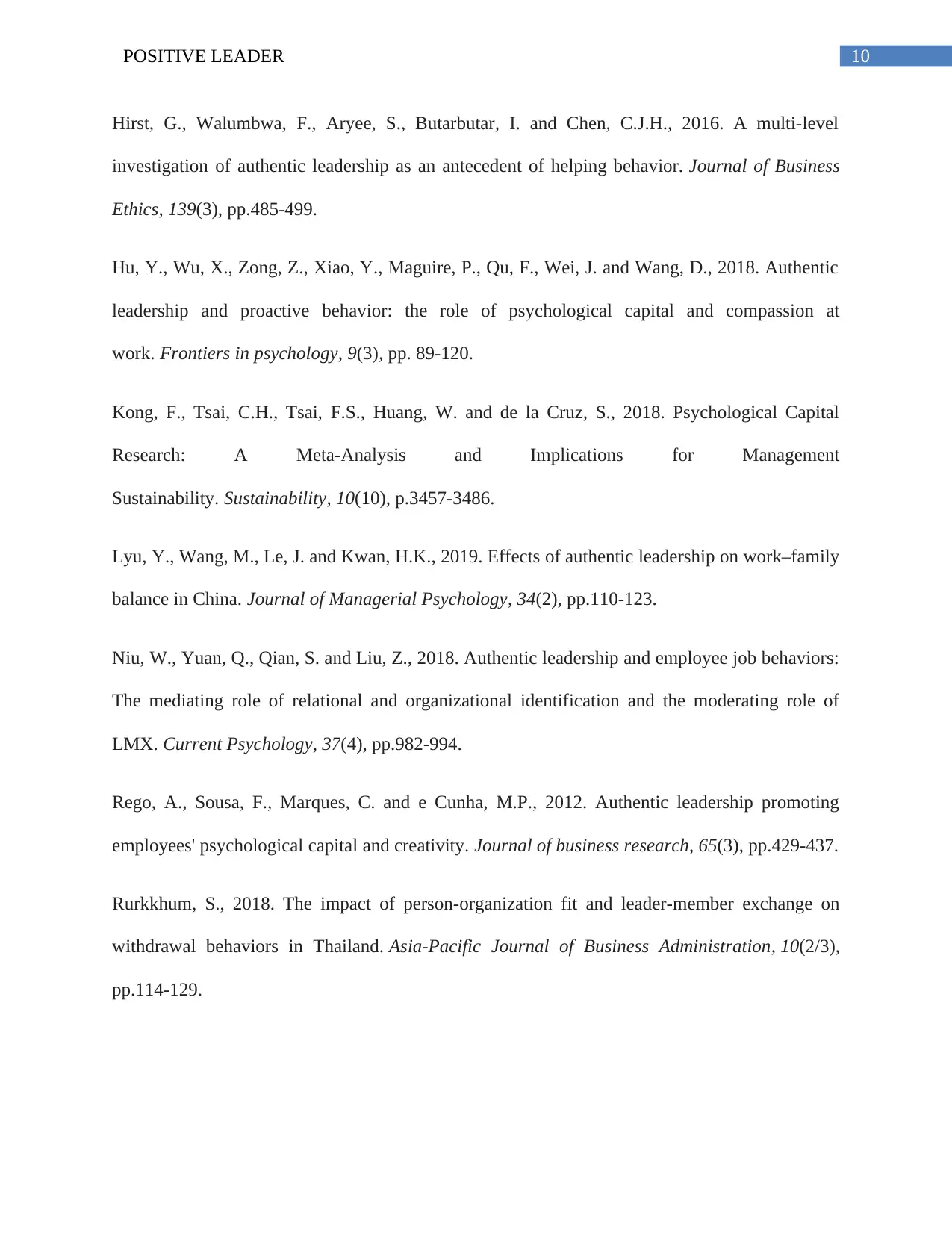
10POSITIVE LEADER
Hirst, G., Walumbwa, F., Aryee, S., Butarbutar, I. and Chen, C.J.H., 2016. A multi-level
investigation of authentic leadership as an antecedent of helping behavior. Journal of Business
Ethics, 139(3), pp.485-499.
Hu, Y., Wu, X., Zong, Z., Xiao, Y., Maguire, P., Qu, F., Wei, J. and Wang, D., 2018. Authentic
leadership and proactive behavior: the role of psychological capital and compassion at
work. Frontiers in psychology, 9(3), pp. 89-120.
Kong, F., Tsai, C.H., Tsai, F.S., Huang, W. and de la Cruz, S., 2018. Psychological Capital
Research: A Meta-Analysis and Implications for Management
Sustainability. Sustainability, 10(10), p.3457-3486.
Lyu, Y., Wang, M., Le, J. and Kwan, H.K., 2019. Effects of authentic leadership on work–family
balance in China. Journal of Managerial Psychology, 34(2), pp.110-123.
Niu, W., Yuan, Q., Qian, S. and Liu, Z., 2018. Authentic leadership and employee job behaviors:
The mediating role of relational and organizational identification and the moderating role of
LMX. Current Psychology, 37(4), pp.982-994.
Rego, A., Sousa, F., Marques, C. and e Cunha, M.P., 2012. Authentic leadership promoting
employees' psychological capital and creativity. Journal of business research, 65(3), pp.429-437.
Rurkkhum, S., 2018. The impact of person-organization fit and leader-member exchange on
withdrawal behaviors in Thailand. Asia-Pacific Journal of Business Administration, 10(2/3),
pp.114-129.
Hirst, G., Walumbwa, F., Aryee, S., Butarbutar, I. and Chen, C.J.H., 2016. A multi-level
investigation of authentic leadership as an antecedent of helping behavior. Journal of Business
Ethics, 139(3), pp.485-499.
Hu, Y., Wu, X., Zong, Z., Xiao, Y., Maguire, P., Qu, F., Wei, J. and Wang, D., 2018. Authentic
leadership and proactive behavior: the role of psychological capital and compassion at
work. Frontiers in psychology, 9(3), pp. 89-120.
Kong, F., Tsai, C.H., Tsai, F.S., Huang, W. and de la Cruz, S., 2018. Psychological Capital
Research: A Meta-Analysis and Implications for Management
Sustainability. Sustainability, 10(10), p.3457-3486.
Lyu, Y., Wang, M., Le, J. and Kwan, H.K., 2019. Effects of authentic leadership on work–family
balance in China. Journal of Managerial Psychology, 34(2), pp.110-123.
Niu, W., Yuan, Q., Qian, S. and Liu, Z., 2018. Authentic leadership and employee job behaviors:
The mediating role of relational and organizational identification and the moderating role of
LMX. Current Psychology, 37(4), pp.982-994.
Rego, A., Sousa, F., Marques, C. and e Cunha, M.P., 2012. Authentic leadership promoting
employees' psychological capital and creativity. Journal of business research, 65(3), pp.429-437.
Rurkkhum, S., 2018. The impact of person-organization fit and leader-member exchange on
withdrawal behaviors in Thailand. Asia-Pacific Journal of Business Administration, 10(2/3),
pp.114-129.
Paraphrase This Document
Need a fresh take? Get an instant paraphrase of this document with our AI Paraphraser
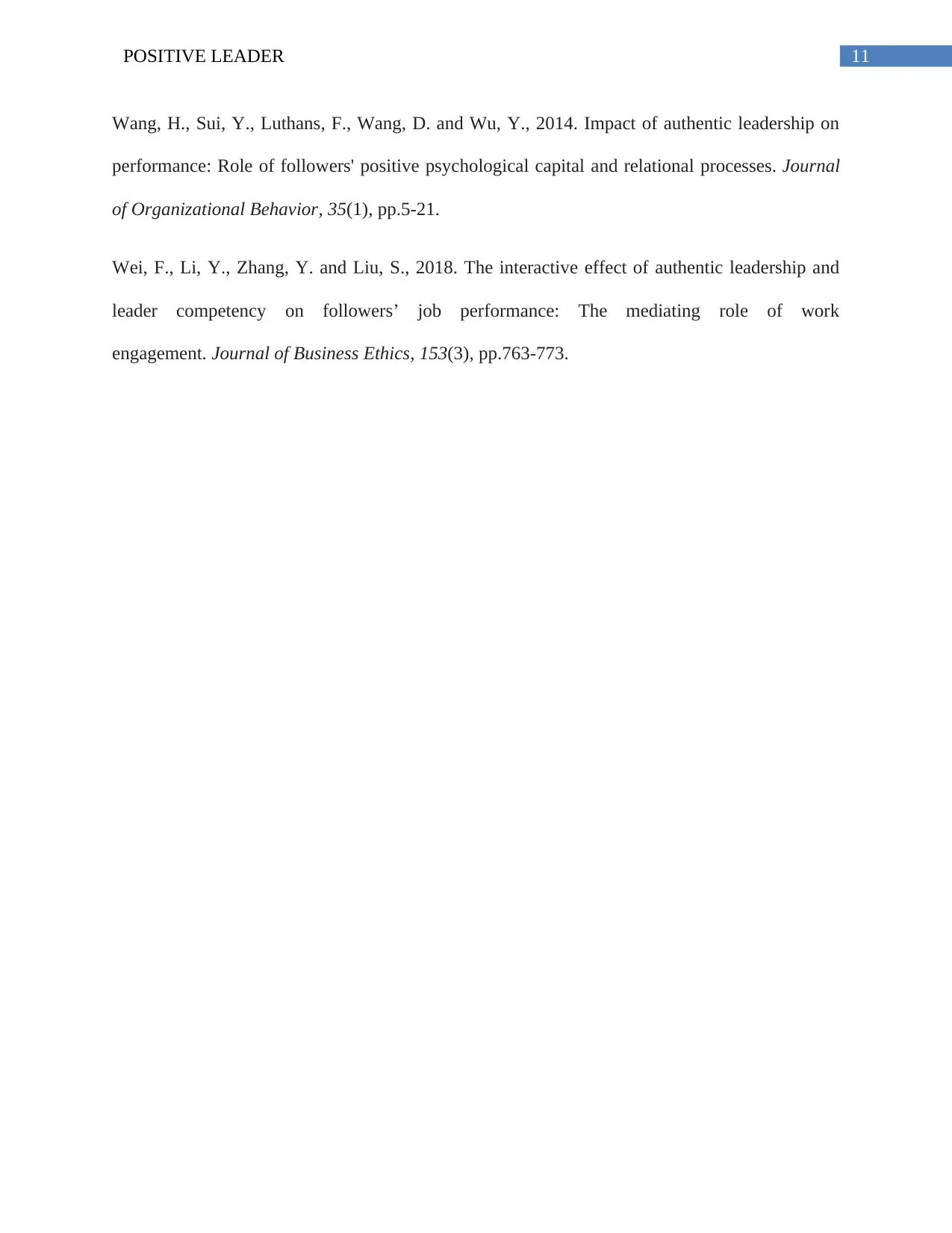
11POSITIVE LEADER
Wang, H., Sui, Y., Luthans, F., Wang, D. and Wu, Y., 2014. Impact of authentic leadership on
performance: Role of followers' positive psychological capital and relational processes. Journal
of Organizational Behavior, 35(1), pp.5-21.
Wei, F., Li, Y., Zhang, Y. and Liu, S., 2018. The interactive effect of authentic leadership and
leader competency on followers’ job performance: The mediating role of work
engagement. Journal of Business Ethics, 153(3), pp.763-773.
Wang, H., Sui, Y., Luthans, F., Wang, D. and Wu, Y., 2014. Impact of authentic leadership on
performance: Role of followers' positive psychological capital and relational processes. Journal
of Organizational Behavior, 35(1), pp.5-21.
Wei, F., Li, Y., Zhang, Y. and Liu, S., 2018. The interactive effect of authentic leadership and
leader competency on followers’ job performance: The mediating role of work
engagement. Journal of Business Ethics, 153(3), pp.763-773.
1 out of 11
Related Documents
Your All-in-One AI-Powered Toolkit for Academic Success.
+13062052269
info@desklib.com
Available 24*7 on WhatsApp / Email
![[object Object]](/_next/static/media/star-bottom.7253800d.svg)
Unlock your academic potential
Copyright © 2020–2026 A2Z Services. All Rights Reserved. Developed and managed by ZUCOL.




